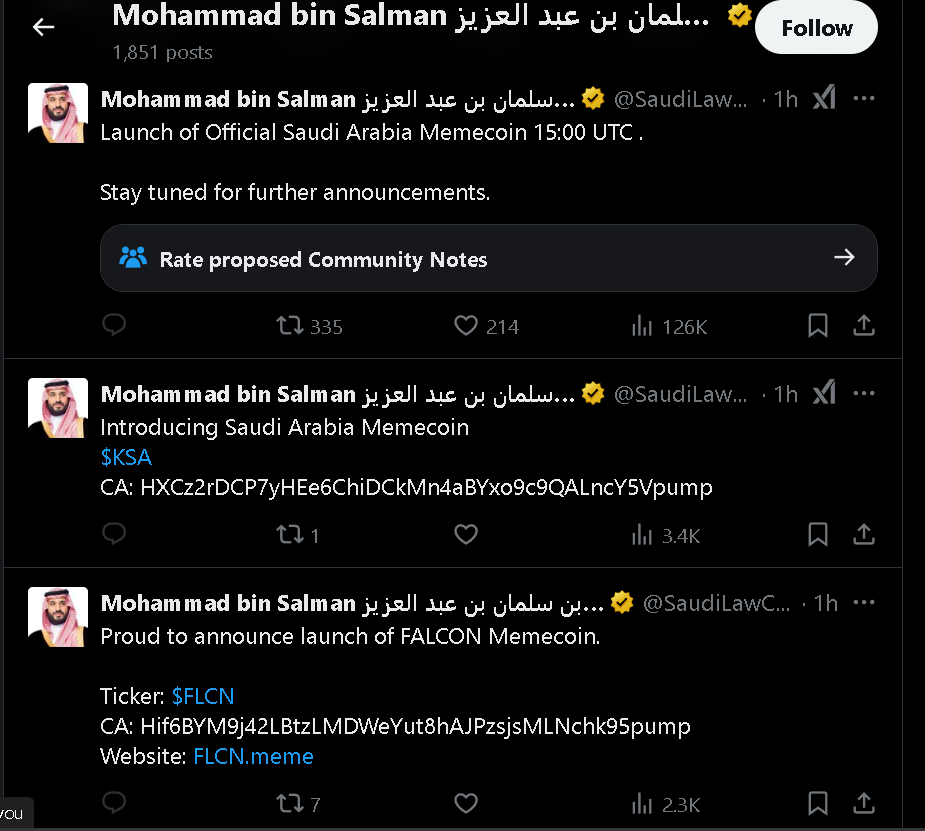Scammers have once again exploited the growing popularity of celebrity-endorsed memecoins, this time impersonating Saudi Arabia’s Crown Prince Mohammed bin Salman. The fraudulent KSA memecoin was reportedly endorsed on a hijacked X (formerly Twitter) account, where scammers misled investors into believing the token had an official endorsement.

Scammers hijacked the SLC X account (@SaudiLawConf) at the Saudi Law Conference and used it to promote the scam Saudi Arabia memecoin (KSA). Shortly after, the original owners of the account confirmed that the account was hacked, warning investors that all recent posts on the account were fake. This incident is consistent with previous memecoin scams linked to political figures, as concerns of heightened retail investor manipulation in the crypto space mount.
The Fake KSA Memecoin: How the Scam Unfolded
The KSA meme coin scam presents itself at a time when it has become all too normal for cryptocurrency scams to hitch a ride on the back of famous people in order to gain legitimacy. Scammers here tried to deceive investors by making fake claims of affiliation with Saudi Arabia’s Crown Prince. The strategy of deception is nothing new, but its popularity within the memecoin universe is alarming. Below, we explain how this was a scam and how public opinion was manipulated.
- On February 17, the fake KSA memecoin was promoted on the hijacked X account SaudiLawConf, falsely implying that the Saudi Crown Prince supported it.
- No Official Government Communication – The Saudi government never issued any statement regarding the token.
- Lack of Transparency – There was no publicly available information about tokenomics, smart contract auditing, or the utility of the token.
- Verified Account Hack – The owners of the accounts first confirmed via LinkedIn that they had lost access to their X account.
This follows the recent trend of scam meme coins falsely claiming celebrity or political endorsement to manipulate unsuspecting investors

Saudi Law Conference Confirms the Hack
In an attempt to trick investors, the scammers hijacked the Saudi Law Conference’s (SLC) X account and utilized it in promoting the spoofed KSA memecoin. The impersonation of a legitimate entity lent an air of authenticity, causing traders to be confused. Immediately following the spoofed announcement, the genuine SLC team issued a statement to state that their account had been hacked. Their swift move helped to expose the scam and prevent further fraud, but it also highlights the mounting threats of social media-based cryptocurrency scams.
The Saudi Law Conference did not waste any time, making a public alert that their official X account was hacked. Their LinkedIn post of February 17 stated:
“The conference management reports that the official conference account on the X platform (@Saudilawconf) has been compromised and that all content now published through the account does not express our opinions or official positions at all.”
This confirmed that the KSA token promotion was a fraud and had no governmental or Crown Prince affiliation at all.
Scammers Take Advantage of Political Memecoin Trends
Memecoin scams linked to political figures have become increasingly common as scammers exploit the public’s enthusiasm for novelty crypto assets. The fraudulent KSA token follows the same deceptive pattern seen in other political memecoin schemes, such as the Milei-endorsed Libra token and Trump-themed memecoins. These types of scams leverage hype, misinformation, and fake endorsements to drive investor interest. Understanding how these fraudulent projects operate can help traders recognize red flags and avoid financial losses.
This Saudi meme coin scam follows similar incidents involving politically linked tokens, such as:
- Argentine President Javier Milei’s Libra (LIBRA) meme coin crashed 94% within hours after insider wallets cashed out $107 million worth of liquidity.
- Fake Trump-themed memecoins (TRUMP, MELANIA) launched in January 2025, but have underperformed compared to the wider crypto market.
- The fake KSA token launched on February 10, a full week before the fraudulent announcement, further exposing the scam’s pre-planned nature.
The pattern of meme coin scams leveraging political figures highlights the urgent need for investor due diligence before investing in such tokens.
Expert Analysis: Protecting Investors from Memecoin Frauds
As cryptocurrency scams evolve, experts recommend caution and security measures when investing in memecoins. Scam projects make use of social media platforms, fake celebrity endorsement imitations, and manipulated market data to create artificial demand. Experts in the industry discuss the indicators of meme coin scams and provide recommendations on how investors can protect themselves from losing money by verifying token authenticity and conducting thorough research before making any investment.
Anndy Lian, Blockchain Expert and Author:
“Don’t just throw your cash at something because it’s got a catchy name or claims to be ‘official.’ Check who’s behind the project. If the team is all mysterious or you can’t dig up any real info on them, that’s a red flag waving right in your face.”
Dr. Michael Reeves, Crypto Security Analyst at Blockchain Alliance:
“Memecoin scams are becoming increasingly common, with scammers exploiting high-profile figures to create artificial hype. The best protection is to verify sources, check smart contract audits, and avoid FOMO-driven investments.”
Red Flags That Exposed the Saudi Arabia Memecoin Scam
Awareness of scam cryptocurrency project warning signs is required for investors looking to trade the market safely. For the imposter KSA meme coin, some red flags showed potential risks, including a hacked social media account, no official government announcement, and undefined tokenomics. These indicators are important takeaways for traders, validating the need for verifying crypto projects before investing. Following are the main signs of warning that were instrumental in uncovering the scam.
- No Government Announcement – Saudi government never made an announcement regarding involvement with the token.
- Hacked Social Media Account – The announcement source of the project was hacked.
- No Whitepaper or Tokenomics – A reputable cryptocurrency project provides transparent information regarding its supply, use case, and security audits.
- Pre-Launched Smart Contract – The token was already there prior to its phony official release, suggesting a predetermined scam

Conclusion: Lessons from the Saudi Arabia Memecoin Scam
The Saudi Arabia meme coin scam serves as a reminder to crypto investors of how scammers utilize social media, fake endorsements, and misinformation to deceive traders. With increasing scam tokens entering the market, investors must conduct their own research, verify sources, and be cautious of hype-driven projects. The lesson to be learned from this instance is caution, education, and skepticism within the digital asset ecosystem.
The fake Saudi Arabia memecoin drama is a reminder to look for official endorsements before investing. Scammers are now resorting to high-profile personalities and hacked social media accounts to mislead investors. As politically related memecoins receive attention, the risk of scam projects only grows.
Investors should be careful, conduct their own research, and refrain from placing reckless investments in tokens without any official transparency. With more scams surfacing, being educated is the best shield one can use against crypto scams.
The BIT Journal is available around the clock, providing you with updated information about the state of the crypto world. Follow us on Twitter and LinkedIn, and join our Telegram channel.
FAQs
1. What was the fake KSA memecoin?
It was a fraudulent token falsely claiming to be linked to Saudi Arabia’s Crown Prince, promoted via a hacked X account.
2. How was the scam exposed?
The original Saudi Law Conference (SLC) account holders confirmed their X account was hacked, and no official government sources endorsed the token.
3. Are politically linked meme coins risky?
Yes. Many politically themed tokens lack transparency and are vulnerable to pump-and-dump schemes, making them highly speculative.
4. How can investors protect themselves from memecoin scams?
Always verify official sources, check for proper audits, research the development team, and avoid investing based solely on endorsements.
Glossary
- Memecoin: A cryptocurrency with no fundamental value, often created as a joke but sometimes used for speculation.
- Pump-and-Dump: A scam where token prices are artificially inflated before insiders sell, leaving other investors with losses.
- Tokenomics: The supply, distribution, and economic model of a cryptocurrency.
- Liquidity: The ease with which an asset can be bought or sold without significantly impacting its price.
- Smart Contract Audit: A security review of a blockchain project’s code to identify vulnerabilities.





























